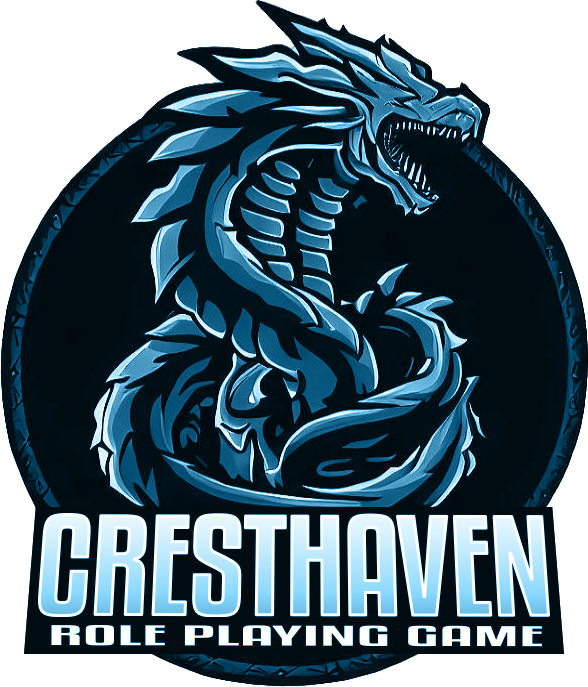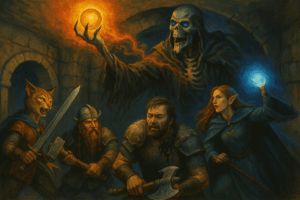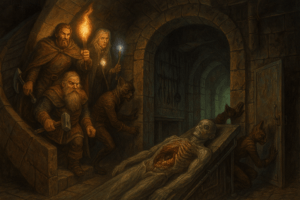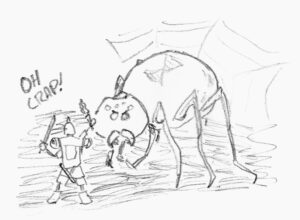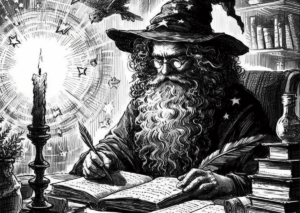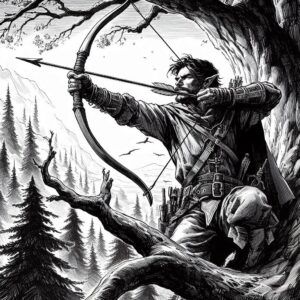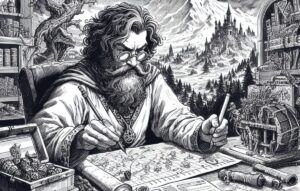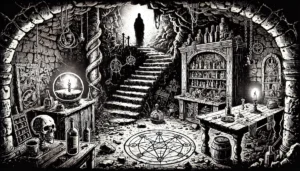The temple doors groaned under the weight of the wind, shuddering against the iron bar that held them shut. Ancient oak, carved with the forgotten symbols of Aysys in her true form—stars intertwined with roots, moons cradled in branches—now strained against the fury of the storm. Outside, the tempest howled like a wounded god—lightning lashing the hills with silver-blue whips, thunder shaking the stones beneath their feet as if the very earth sought to break free of its bindings. Rain pounded the temple roof in a deafening rhythm, a thousand fists beating on sacred ground, demanding entry to hallowed halls that had forgotten their true purpose.
Inside, the temple sanctuary was dim, its candles guttering in their bronze sconces like dying stars. The vaulted ceiling, once painted with constellations now faded by time and doctrine, disappeared into shadow. Tapestries depicting Aysys—not as wild goddess but as tamed servant of the Sky King—hung limp and damp from walls where moisture seeped through ancient stone. The faithful huddled beneath the high arches, whispering prayers that cracked and broke like dry leaves in autumn. A child cried softly beneath a pew, her tears mingling with rainwater that leaked through the roof. A weathered farmer clutched his wife’s trembling hand as if she might vanish into shadow, his knuckles white with fear and desperate hope.
The party stood at the heart of the nave, soaked to the bone, watching the doors. Water dripped from Kaelen’s beard, running in rivulets down the scars that marked his weathered face. Thimara’s fur clung to her lithe form, her ears flat against her head, amber eyes reflecting what little light remained. Durim’s armor gleamed dully, the runes of Puh-Tah occasionally pulsing with subdued power. Aelinthir’s white robes, now translucent with rain, clung to her slender frame, yet she stood tall, her silver hair a beacon in the gloom.
Then the scratching began.
Not loud. Not dramatic. Just the soft, deliberate scrape of something sharp against wood. Once. Twice. Like a traveler seeking entry, but with too-long nails and too-slow purpose.
Durim turned his head slowly toward the sound, his war-braided beard dripping onto the flagstones. “That’s not the wind,” he said, his voice a low rumble that seemed to vibrate the very air around them. His hand moved to the hammer at his belt, fingers closing around the worn handle as if greeting an old friend.
Another scratch. Closer now. Then the sound of fingers—wet and clawed—dragging down the surface of the doors. A low growl followed, a sound no human throat could make. Or was it the groaning of the storm? The line between natural and unnatural had grown thin as gossamer.
Kaelen drew his axe in one fluid motion, the movement so practiced it seemed an extension of thought rather than action. The runes etched along its length—ancient dwarven script that spoke of protection and righteous fury—pulsed like veins catching fire, bathing his stern features in ghastly blue light. “They followed us,” he said, his voice steady despite the horror implied in those three simple words.
“No,” Aelinthir murmured, stepping forward. Her bare feet made no sound on the cold stone floor, as if she walked between worlds rather than upon them. “They were already here.” Her eyes, normally the color of summer leaves, now glowed with an inner light that matched the storm’s fury—wild and ancient and knowing.
From the rafters above, a crow let out a shriek—its presence in the sealed temple unexplained and ominous—and the wind died. The sudden silence pressed against their ears like cotton wool, unnatural and smothering.
Then, silence complete.
Until the doors exploded inward.
The iron bar held for a heartbeat longer—then snapped with a sound like bone breaking under weight, the metal twisting as if it were no stronger than a dry twig. Rain and wind blasted through the opening like a curse given form, carrying with it the stench of wet earth and something fouler—the sweet-rot smell of death denied its natural course.
Figures stumbled through the threshold—half-seen in the flashes of lightning that now reached inside the sanctuary like probing fingers. Twisted limbs bent at impossible angles. Mud-caked faces bearing remnants of humanity—a beard here, a woman’s long hair there, a child’s small form—but stripped of the light that separates the living from the dead. Eyes glowing faint blue, like ice catching fire or stars drowning in murky pools.
One of the villagers screamed, the sound high and thin against the storm’s renewed fury.
The first creature lunged forward with unnatural speed, catching a farmhand—the miller’s son, barely seventeen—before he could flee. Its claws, once human fingers now elongated and sharp as filed bone, tore through homespun cloth and sunbrowned flesh with equal ease, dragging him down with a strength that defied its wasted frame. Blood sprayed across the flagstones in an arc of crimson, pattering like obscene rain.
Chaos erupted, primal and absolute.
Screams rose like wildfire, spreading from one terrified throat to another. The faithful scattered in every direction—some towards the vestry, others back toward the inner chambers, many simply cowering where they stood. Father Harder, his face ashen beneath his ceremonial paint, raised his hands high. The symbol of Aysys—a crescent moon wrapped in flowering vines—dangled from his fingers, glinting dully in the sporadic lightning. His voice cracked the air like a whip. “In Her name, I banish you!”
A wave of divine light, silver-white yet tinged with green at its edges, surged outward from his holy symbol, forcing the frontmost undead back. One—a woman whose wedding dress still clung to her desiccated form in moldering tatters—burst into flame where it stood, its limbs flailing in mindless agony as holy fire consumed unholy flesh.
Durim stepped beside the priest, his stocky frame suddenly immovable as mountain stone. He slammed his warhammer against the floor, the impact sending tremors through the ancient flagstones. “Puh-Tah! Soul-forger, lend me fire!” The prayer, spoken in the ancient tongue of the dwarven halls, ignited the runes along his arm and those embedded in his hammer’s head. With a bellow that echoed like forge-thunder, he brought his weapon down upon the head of a lurching corpse. Skull shattered like pottery beneath the blow, fragments of bone and worse things spraying outward. The body fell twitching to the floor, arms still reaching, fingers still grasping.
“Keep them away from the villagers!” Kaelen roared, stepping into the breach where once doors had stood. His massive frame, silhouetted against the storm beyond, seemed suddenly larger than life—a bulwark against the tide of death that sought entry.
A monster surged toward him, arms outstretched and jaw slack, hanging at an impossible angle. This had once been the blacksmith—Kaelen recognized the tattoos still visible on forearms now gray with death. He met it with steel and fury, no hesitation for the man this thing had once been. His greataxe swept in a wide arc, catching the light of Durim’s runes—and cleaved the undead clean in half, from shoulder to hip, viscera flying in two directions. The creature collapsed in twitching pieces, one arm still clawing at the floor until Kaelen’s boot ended its unnatural movement with a sickening crunch.
Aelinthir raised her staff, carved from wood so pale it seemed almost to glow from within. Her eyes had changed completely now, becoming pools of light that burned away all color. “Clear a path,” she commanded, her voice echoing strangely, as if spoken both from her lips and from somewhere far beneath the temple floor.
Kaelen nodded once, understanding without words. He swept his axe in another mighty arc, cutting down three shambling corpses in a single blow, creating a space before the doorway. She stepped into the center of the sanctuary and lifted her hand toward the rain-drenched night beyond.
“Naethir kal’voss!” she intoned, ancient elven words of power that seemed to bend the very air around her—and unleashed a fireball into the darkness beyond the doors.
The blast lit the storm like a second sun, banishing shadows and revealing, for one terrible moment, the full scope of what awaited them—dozens upon dozens of walking dead, a congregation of the damned surrounding the temple on all sides. The explosion roared through the rain, its heat turning water to steam in an instant, catching half a dozen of the undead in its heart. For a heartbeat, they burned like candles—limbs thrashing, mouths opening in silent screams—then burst apart in sprays of bone and smoke, leaving nothing but charred earth where they had stood.
The light faded, swallowed by the night’s hunger.
More were coming. Always more.
Thimara moved like shadow between pews, her catfolk heritage evident in every perfect movement. No wasted motion, no hesitation. She ducked under grasping limbs, rolled past snapping jaws, her body flowing like water between obstacles. She lashed out with her curved daggers—heirlooms of her clan, marked with symbols of the moon—cutting tendons, crippling joints, never attempting to kill what was already dead, but making them harmless all the same.
A corpse grabbed for her cloak—once a baker by the flour still ground into his gray skin—and she twisted free with impossible grace, flipped backward over a fallen candlestick, landed on a bench with perfect balance and drove both daggers into its skull before flipping away again. The daggers came free with a wet sound as the body crumpled.
“Don’t get surrounded!” she called out, her breath coming fast, her slit pupils widened in the dim light. “They don’t stop. They don’t think. They just—”
A scream interrupted her warning.
One of the villagers—an old woman who had tended the temple gardens for forty years—had fallen near the altar steps, her ancient knees finally betraying her. An undead loomed over her, jaws wide enough to reveal blackened gums and a throat filled with writhing darkness, too close for salvation.
Kaelen charged, muscles straining, axe raised, but he was too far, separated by a sea of shambling bodies and panicked villagers.
The monster lunged—
—and a bolt of silver-green light struck it in the chest with such force that its ribcage exploded outward. Father Harder stood with his arm outstretched, face pale as winter moon, voice shaking with effort and fear. “Not… this time,” he whispered, the words barely audible yet somehow reaching them all.
The creature burst apart in midair, holy fire consuming it from within before it hit the floor, leaving nothing but drifting ash that settled on the old woman’s horrified face like macabre snow.
The old woman sobbed, prayers to Aysys—the old Aysys, not the tamed goddess of temple walls—spilling from her lips. Kaelen reached her seconds later, pulling her back behind the line of defense they had established, setting her gently against a pillar before returning to the fray.
Durim and Harder stood shoulder to shoulder at the temple entrance, an unlikely alliance of old faith and new. Divine magic pulsed between them like a living thing—Harder’s silvery light of Aysys and Durim’s forge-hot power of Puh-Tah intermingling in waves that pushed back the darkness. Aelinthir moved like a starfall, casting light in long arcs across the stained glass windows, her spells illuminating saints and sacred symbols alike in merciless clarity. Kaelen’s axe rose and fell like a pendulum of death, each swing precise despite its power, never tiring, never slowing. And Thimara danced through shadows, her knives always finding soft places where bone met rot, her amber eyes gleaming in the dark like twin moons.
Still they came.
The dead. The forgotten. The restless.
Not seeking vengeance as in children’s tales. Not even hunger as in fireside stories.
Just rage. Mindless, unyielding, eternal—as if the very earth that had held them now rejected their bones, forcing them upward into unlife.
The storm raged. The temple held.
But for how long?
The doors did not hold.
They held the first wave. The second. But not the third.
When the hinges snapped and the iron bar screamed against the stone, the dead poured in—not like an army, but like floodwater finding the lowest point. The press of them was relentless. Cold hands with broken nails. Rotted jaws with teeth like yellowed ivory. Screams of the dying rose and were swallowed by thunder that shook the foundations of faith and stone alike.
They came in waves—slow, shambling, collapsing under axe and fire, only for more to stumble over their bodies, clawing forward in a tide of death that knew no end and felt no pain. For each one that fell, two more appeared in the doorway, silhouetted against lightning that now struck the temple yard with increasing frequency, as if the sky itself sought to cleanse the earth of this abomination.
Durim and Father Harder stood at the base of the altar, arms lifted high, sweat pouring from their brows, lips raw with prayer. Light flared from their symbols—blessed fire that repelled the unclean, burning away corruption wherever it touched. For every one they burned, two more took its place, an endless procession of horror.
“Out of light!” Durim shouted, voice hoarse from hours of prayer and battle. His beard was singed, his face streaked with soot and blood not his own. “It’s all torch smoke and ash!” The divine energy that had flowed so freely through him earlier now came in stuttering bursts, like a stream running dry in drought.
Father Harder’s hands trembled visibly. Blood ran from his nose, staining his ceremonial vestments crimson. His voice faltered mid-chant, the words of power becoming slurred and ineffective. The strain of channeling powers he barely understood showed in every line of his face.
The divine light dimmed, receding like a tide, leaving shadows to creep closer to the huddled survivors.
Kaelen held the threshold where doors had once stood, his axe drenched in ichor that steamed in the cool air. For every strike, a body fell—but for every body that fell, two more stepped over it, an endless procession of horror. His arms burned with fatigue. His knees trembled beneath his mighty frame. But still, he swung, each blow a defiance against the inevitable.
One undead, bloated and taller than the rest—once the village reeve, his chain of office still dangling from his neck—charged him with unnatural speed. Kaelen dropped his shoulder, drove forward, and with a roar that echoed through the shattered nave, tore his axe upward through the thing’s midsection, splitting it clean in half from groin to crown. The halves kept moving independently, arms reaching, mouth still working in half a face, until Kaelen kicked one back through the doorway and crushed the other under his boot with a sound like overripe fruit bursting.
“Running out of room!” he shouted, his voice carrying over the cacophony of battle and terror.
“Not yet,” Thimara said, panting, a slash across her cheek leaking blood down her furred face. She had not stopped moving since the doors broke. Ducking. Slipping. Vaulting pews. Her daggers were red and rusting with gore, their once-bright silver now darkened with the taint of unnatural death. She was tired—muscles screaming, lungs burning—but not slowing. Not dead. Not yet.
Aelinthir stood near the altar steps, her back straight as a temple column, robes torn at the sleeve where dead fingers had grasped at her. Her voice had changed—no longer a whisper, but a song that seemed to rise from the depths of the earth itself. Her magic, once refined and precise, now wild and vast, tore through the dark in scorching waves. A line of fire carved a path across the nave, lighting half a dozen corpses ablaze. They screamed—some in agony, some without sound, mouths open in silent horror—and still more came, trampling over their burning brethren without hesitation.
A man in the crowd—the cooper whose barrels had once held the village’s harvest—tried to run toward a side exit, panic overriding reason. A woman grabbed her daughter and fled toward the chapel side doors, hope overriding wisdom. They didn’t make it three steps.
The undead fell on them in a blur of claws and broken teeth, a feeding frenzy that belied their shambling approach. Blood splashed across painted icons of Aysys, defiling her tamed image with the reality of death unleashed.
The girl’s scream cut through everything like a knife through silk—high, pure, terrified—and then stopped with such suddenness that the silence it left was more terrible than any sound could be.
Hope flickered, guttering like the last candle in a crypt.
Durim dropped to a knee, his hammer’s head resting on the stone floor. “Can’t hold—” he gasped, the words thick with exhaustion and despair.
Then, something changed.
It was subtle at first. The wind softened from howl to whisper. The groaning roof timbers fell silent, as if the very building held its breath. A breeze passed through the gaping doorway—cool, and strangely sweet, carrying the scent not of death and rain but of wildflowers and spring mornings. The storm… was ending. Or changing.
Aelinthir, eyes glowing white as twin moons, gasped, her chant faltering mid-syllable. Her fingers stilled upon her staff, which now thrummed with a power not of her making. “Something comes,” she whispered, the words barely audible yet somehow reaching every ear.
The undead faltered in their relentless advance.
One stumbled forward—then paused, as if confused by some inaudible command. Another raised its clawed hand toward a cowering child, but did not strike, the limb frozen in midair. A third moaned, uncertain, its clouded eyes shifting as if seeking direction from an unseen master.
Then the light returned.
It was not fire. Not divine in the way of temples and priests.
It was moonlight—pure, silver, ancient beyond reckoning.
The clouds broke like a curtain torn wide by some cosmic hand, and a great silver moon, full and perfect, poured its light through the broken windows, flooding the nave. The wind died completely. The thunder hushed to distant murmurs. The rain faded to a whisper, then to nothing at all.
And the undead… stopped.
They stood, swaying like reeds in an invisible current, limbs trembling with some inner struggle. Their eyes—once filled with cold blue fire—now reflected only moonlight, empty of purpose or rage.
Then one by one, they collapsed. Not burned by holy power. Not banished by arcane might.
Just… emptied. As if whatever force had animated them had simply withdrawn, leaving them to the natural laws they had defied.
The final one—a child, no more than ten when life had graced its form—reached forward with small fingers, blind, jaws working as if trying to form words long forgotten. Then it, too, fell, its bones clattering against the stone floor with a sound like wind chimes, grotesque and final.
Silence descended, absolute and profound.
Smoke curled from cracked walls where magic had scorched stone. Flames guttered in broken braziers, casting long shadows across the dead and living alike. The air stank of death and fire and iron—the scent of battle that would linger in the stone for years to come.
The living stood among the fallen. Bloodied. Shaking.
Breathing.
Through the shattered doorway, stars shone with impossible clarity, as if the heavens themselves had been washed clean by the storm’s fury.
Kaelen slumped against the doorframe, axe dragging behind him, its edge notched and dulled by the night’s grim work. His great shoulders rose and fell with each labored breath, blood—both his and others’—drying in the creases of his weathered hands.
Durim leaned heavily on his warhammer, its head scored by contact with unnatural bone. He muttered a prayer of gratitude to hands long dead—the ancestors whose craft had forged his weapon, whose blood ran in his veins, whose strength had kept him standing when all else failed.
Aelinthir wiped blood from her lip with a sleeve already stained beyond recognition. Her eyes, returned to their natural green, stared out at the cemetery visible on the hillside, where no movement stirred beneath the watching moon. Her staff, once white as bone, now bore scorch marks along its length, testament to the power that had flowed through it.
Thimara sat on the edge of a pew, chest heaving with exertion, her daggers still clutched in hands that refused to unclench. Her amber eyes never left the dark beyond the threshold, watching, wary, unwilling to believe the threat had truly passed.
Father Harder dropped to his knees before the altar, his symbol of Aysys—the crescent moon and vines—clutched so tightly that its edges cut into his palm, drawing blood that fell like sacrifice upon the stone.
“Thank you,” he whispered, though whether to the goddess as she was or as she had become, even he could not say. “Thank you.”
Outside, the moon watched over Cresthaven, casting long shadows from the gravestones on the hill—each shadow pointing like an accusing finger toward the temple where the living sheltered and the dead lay still once more.
For now.
Discover more from Cresthaven RPG
Subscribe to get the latest posts sent to your email.
